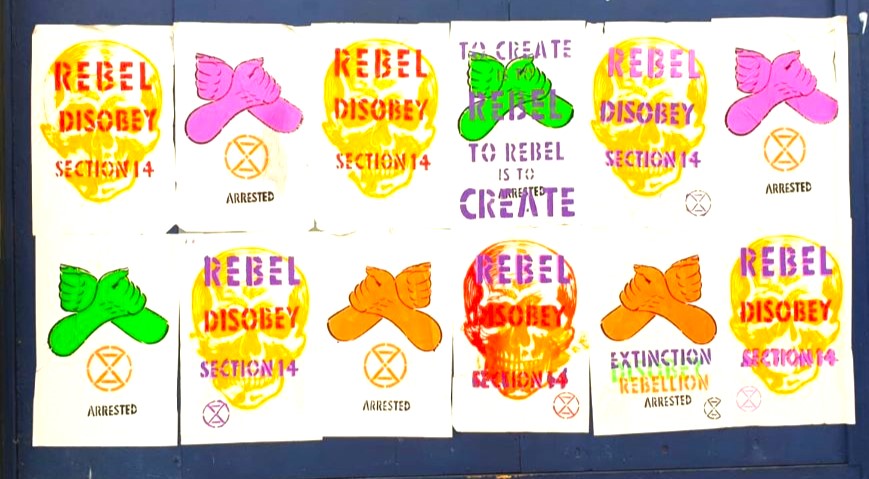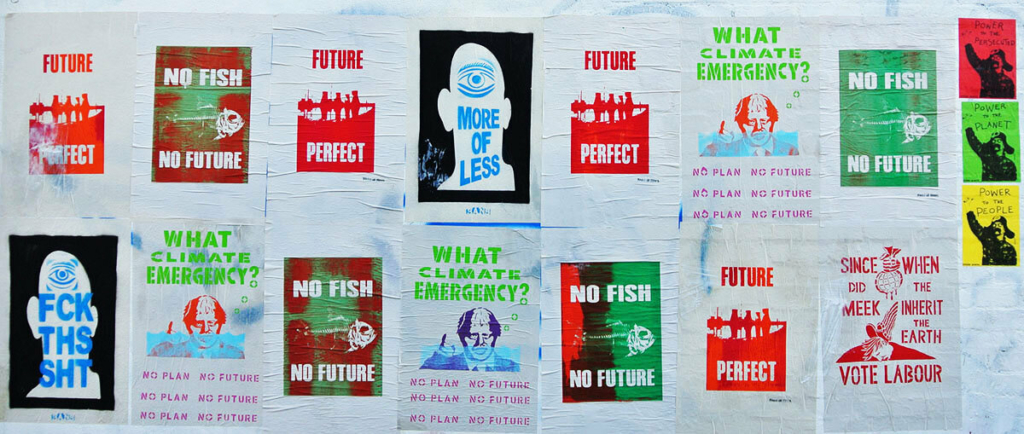New Alliances
Starmer’s Labour Party are the ‘hard-centre’ rather than social (ist) or even a social democratic one. They are to the right of the party under Blair. You have elected less toxic Tories. The challenge is to build new alliances/movements to defeat them.
Where are those forces and what are those alliances?
We’ll be exploring that in a series of articles and public meetings in the coming months.
If you examine what has startled or threatened the British state in recent years you can see some clues to what that might begin to look like. If you look at who and what the most recent repressive legislation was aimed at (Britain’s Niemöller Moment), you can see distinct movements that it is focused on.
Writing in LRB Rebekah Diski notes: “The Police, Crime, Sentencing and Courts Act 2022 and Public Order Act 2023 were trained largely on the direct action wing of the climate movement, although they made room for other targets, notably the rights of Gypsy, Roma and Traveller communities. Policy Exchange, the think tank co-founded by Michael Gove and funded by Exxon-Mobil, inspired much of the detail in the legislative assault on protest with its report ‘Extremism Rebellion’, which described Extinction Rebellion as a ‘subversive’ group planning to precipitate ‘the breakdown of democracy and the state’.”

Cross Fertilisation
Now, new movements are cross-fertilising not out of opportunism or expediency but out of a deeper shared analysis. Diski again: “Young activists, in particular, are connecting struggles against fossil capital with those against racial injustice and colonial oppression. Youth Demand, an offshoot of Just Stop Oil, calls for an arms embargo on Israel as well as an end to new oil and gas licences in the UK. This cross-fertilisation has not gone unnoticed by the state: in May, John Woodcock, a cross-bench peer and government adviser on political violence and disruption, released a report on ‘protecting our democracy from coercion’, noting the overlap of tactics and personnel among the more radical elements of the movements for climate and Palestinian justice. He described these groups as part of a ‘far left subculture’ and recommended removing their rights to assemble and fundraise.”
Some of the same connections are being made by groups like Fossil Free Books.
While these forces have energy and momentum, and are emergent, there are several crucial elements needed to boost those movements into a genuine movement for change.

The first is to (understand) and counter the far-right, whether that be in the form of Disaster Nationalism, Diagonalism or the sort of cultural forces that unleash new forms of misogyny. The movement needs to be explicitly antifa but also needs to have a dimension which is as playful and provocative in the production of its message.
The second is to unite the anti-colonial movements, the anti-racist movements and the anti-oil activism with movements for something: for housing, for cities, for freedoms against police repression, for meaningful work, for liberatory tech, for peace, for land, for a future. We certainly need to break things down and smash things up but we also need to build infrastructures of long-term alternatives. This seems true not just as a response to the realities of social and ecological collapse but also as a way of stepping-back from constantly reactive / defensive politics.
The third is to bring together the people trying to re-make and re-imagine radical alternatives to the chaotic decrepit and corrupt British state. That might sound counter-intuitive but it could be a way of forming new alliances by bringing together the people who are genuinely imagining a transformed Britain in their own part of the world. What would it be like to bring together Irish Peace Babies, Yes campaigners, Welsh cultural activists, English republicans? Uniting in discourse the young people committed to self-determination and imagining a completely different relationship between (and within) the four nations is a key to bringing energy back to the independence movement and also to making common cause across Britain.

These are only outlines to be developed over the coming weeks and months, but the challenge seems to be to step away from the darkly pessimistic narratives, to go on the front-foot and to dispense with stagnant means of organising. This is about realising our collective power in a society designed to isolate us and amplify our individualism, weaponising it against us. This is about shrugging off learned failure, reflexive impotence and re-casting a new left which is liberatory rather than purely reactive and has a movement of movements.
It would have to have some ground rules to have a chance of working. It would have to have participatory and democratic ways of functioning, be resolutely against party-building and have a firewall against sectarianism. It would have to pre-purge the toxicity of the old left.
Organising Desire
Such a movement would be under surveillance and attack from the state and from the far-right, whose defeat would be a principle organising aim.
Considering the threat (and response) to the rise of the far-right, and the movements that have propelled Le Pen, Viktor Orbán, Narendra Modi, Rodrigo Duterte, Donald Trump, Jair Bolsonaro, Javier Milei, and Benjamin Netanyahu to power, Richard Seymour outlines the following (The rise of disaster nationalism‘):
“Against all this, official liberalism has one move, which is to supplement its growth discourse by triangulating the far-right. Just as Biden had sought to neutralise Trump by appropriating parts of his border agenda, Macron’s government has tried to outflank Le Pen by, for example, calling her soft on Islam and fulminating about “Islamo-gauchisme”. This is a weird symbiosis, in which both the hard-centre and the far-right thrive on cultivating hopelessness and punitive desires: sado-pessimism. It legitimises the far-right, who take the win and demand more. Far-right voters aren’t placated because they’re addicted to the animating sense of threat. Meanwhile, liberal critique is neutralised, a fatalistic attitude to racism is engrained, and society is inured to the latest erosion of civilised norms. This is, after all, the pattern on which the far-right has thrived: the steady and accelerating involution of liberal civilization. There is no reason to assume this process has peaked, or that democracy will stabilise given the stresses the climate crisis will place on the system.”
He is right that the ability of the far-right to maximise advantage from general precarity and climate breakdown hasn’t bottomed out.

Seymour again: “There is an inchoate, global fascism in formation. It has expanded at an accelerating rate since the credit crunch, metabolising pervasive social misery, and its growth shows no sign of slowing. But there is a way out. As Will Davies argues in The Happiness Industry, unhappiness today often manifests “as a generalized deflation of desire and capability”. Neoliberal politics, telling us there was no alternative, left us nothing to wish for. Destroying our collective power, it left us nothing to do about it. We have been blackpilled into submission. Disaster nationalism has its remedy which, though it ultimately solves nothing, is more potent than CBT and happy pills. A radical programme, though necessary to reignite political desire, isn’t enough to cut through this. Desire has to be organised. People need to experience their collective power, and not only because it is the only way to enjoy some real victories.”
This then is an opening question for the movement: How do we experience our collective power?

Thanks for this.
“How do we experience our collective power?”
Surely just by doing it. By just stopping, calming and turning to the positive. We are the planet. Human nature is no different from non-human nature. We are not robots but living beings. And the survival of the fittest does not mean the survival of the most ruthless and reckless and violent. Hell is not other people. We don’t exist to fear, fight and exert power over each other (or submit to the power of others), but, like all other species, to benefit the ecosystem as a whole. All our problems come down to a deep seated fear which we no longer need to feel.
We have invented all sorts of technology to exert power over people and planet, but ecosystems don’t respond to central control. Humans are not hackable animals; technocratic totalitarianism is not sustainable and it cannot deliver a future for anyone, even the 1%. Private profit, ‘stakeholder value’, and the economics and public policy based on these ideas are utterly destructive. No-one ‘owns the science’ or has exclusive rights to the ‘facts’. We, on the other hand, have unprecedented opportunities to research and think for ourselves and share the results.
The truth does exist, and it is that people and planet are one, and that the only real ‘owner’ is the planet itself. There is nothing ‘realistic’ about the beliefs of globalists, psychopaths, narcissists and their footsoldiers. They are obsolete because they have faild to deliver a future for humanity. Nothing trickles down (‘you’ll own nothing …’) and their so-called wealth is a mirage of ‘debt’ and obligation that only exists if we believe in it. It is all completely unsustainable and it is collapsing. I just hope it won’t bring us all down with it.
Technologies of all kinds developed to exercise power over something or someone. But we now have the capability to reimagine concepts, technologies, economies, ecologies that serve the needs of the planetary ecosystem as a whole. An ecosystem naturally grows and diversifies and builds abundance – yet we yet we build our societies on scarcity, dependence and misery. We separate ourselves from nature by living and working in suburbs and cities based on 20th c ideas that are ot of date. There is no future in all this at all. Climate targets, ‘Net zero’, microwaving the planet, etc are all just excuses for business as usual, vain attempts to preserve an exploitative lifestyle that wrecks everything.
There is always an alternative, and it may be staring us in the face. We have to challenge every assumption. take responsibility and ‘be the change’ – something that capitalism by its very nature is incapable of doing. The future lies in building trust and mutual aid, and remembering that it is sheer hubris to try to ‘save’ the planet. We need to stop and ask the planet to save us. The simple fact of inter-dependence is at the heart of ecology and all we need to overcome our fear and change the world. Small is beautiful, and genuinely empowering.
It’s all perfectly possible. We just have to see the world from a 21st c perspective rather than a 19th c one. And Bella is great because it is helping to make this happen.
The developmet of technology
Looks as if Neo-Marxism is beginning to lose its momentum. It didn’t catch on in most countries when it was “plain old Marxism”, and the oppressor/oppressed was class-based.
I must admit it was pretty clever when Marxists decided to use race, sex, sexuality, religion, immigration status, etc. as the battle-ground. This is especially at time when equality of race, sex and sexuality was being implemented in law, and people were far more accepting. The Neo-Marxists were pushing at an open door, with a generation of radical left-wing graduates were taking their place in the institutions.
Your big mistake was turning your back on the ordinary, white working classes. True, their power and influence had waned, but they and the non-graduates still formed the majority.
Group identity based ideology has been, and still is the most divisive mindset to have become established since the early 20th Century Marxists and National Socialists were giving democracy a good kicking.
This fear of the move to right is misleading. The overton window had shifted with the Far-Left morphing into the Far-Woke, and taking up an even further left wing stance, leaving the centre and the centre-right where it always was.
Having successfully tapped into youthful rebellion, the far-left are faltering. There is a change happening. Many Gen-Z students are seeing life in universities as a place dominated by extreme Far-Woke/Left and are tired of the pressures to conform. They want to look to a future where they can see normal life, a family, a home, opportunity, free speech, real-tolerance and a happy, safe and prosperous world to handover to their children. You cannot offer them that with your radical extreme left and woke politics being front and centre of the narrative. You have failed.
Who is “you”?
LOLs.
Hi Mike
Love this piece and I think you’re aware that SANE have been working for a number of years on the radical municipalist approach which speaks to many if not all of issues raised here. The Fearless Cities network are holding a 3 day conference in Sheffield 1st -3rd November a great opportunity to link to an international/ global movement seeking to recast democracy outwith the destructive imaginary of capitalism, colonialism and patriarchy.
Always happy to talk ☮️
Thanks Mark, lets meet up? Drafting an outline of groups to network with – definitely including SANE
This makes broad sense. For example, there are probably more English republicans than the combined populations of Wales, Northern Ireland and Scotland. Once you ratify a codified constitution with a significant degree of optionalisation, you are encouraged to think about changes that the ruling classes prefer left unthinkable.
I would rate infiltration/poseurship above surveillance and attack, and even cacophony ranks alongside these threats. And bad arguments can undermine even the best of causes (though bad arguments are a more typical sign of bad causes, of course). I have been looking at the campaign group Republic, and I find they have a mix of good and bad arguments, which illustrates that a level of discrimination is required in making alliances (you can agree with one goal, reject another, dispute particular arguments etc).
Missing from this article: know your history. Some people might just be waking up to how evil are the ruling classes (and possibly much of the electorate) of countries (maybe their own) they thought were ‘good guys’. This is an old story. The evil is often in plain sight, if you look in the right direction, can be found if you ask the right questions. Which countries are closing down History departments? Which are rewriting their official histories to be more patriotic? What can we learn from past dissent, and from the testimonies of ordinary people you trust compared to official (sacred) myths? Where can we see those myths being put into deadly force in the world today?
Hi – thanks. Yes, agreed a programme of political education / radical histories should be part of any movement building.
“We certainly need to break things down and smash things up”
Yes, that always works; it’s what the likes of Liz Truss, The Heritage foundation and Policy Exchange want to do – smash things up without having an iota of with what they’re going to replace what they’ve destroyed! We are at the fag end of a disastrous economic experiment that began in 1979; Starmer’s Labour are dancing about in fag ash claiming a new beginning; people are TIRED.
Another helpful, creative address to *the* issue of our time, how to resist & overcome the status-quo march towards destruction. You rightly highlight the word ‘experience,’ as in how to we experience our power, our hopefulness, our growing solidarity. The answers are multifold as they are humble: getting a friend to participate in her/his first-ever march; creating-donating-staffing mutualist undertakings and ad hoc “institutions” like food banks, free libraries, sewing/knitting/crafting circles that produce garments and objects useful both to the housed poor and those living rough. In the 60s, we undertook many largely ad hoc endeavors of this sort in the US, with the operative word always being ‘free’–as in free food, free space, free entertainment, and so on. This is how we build, sustain, and increase the crucially needed feeling of hopefulness, playfulness, commitment and leaderfulness amongst us. What we need is not leaders, but leadership…which is in each of us, awaiting realization through experience, cooperation, confidence in self and others. We can build it–we *must* build it!